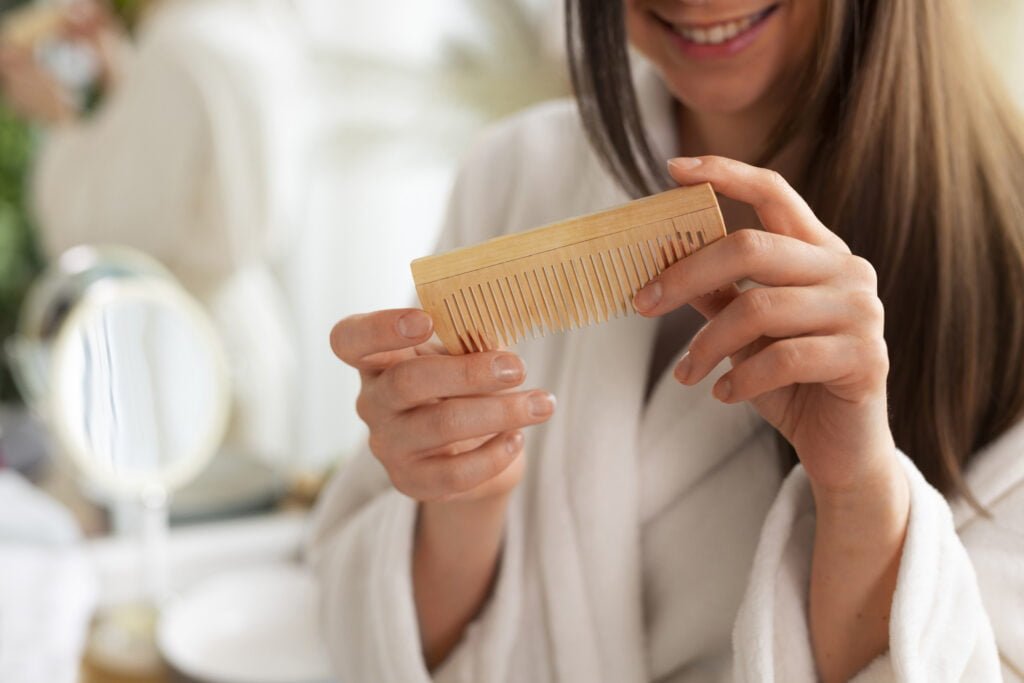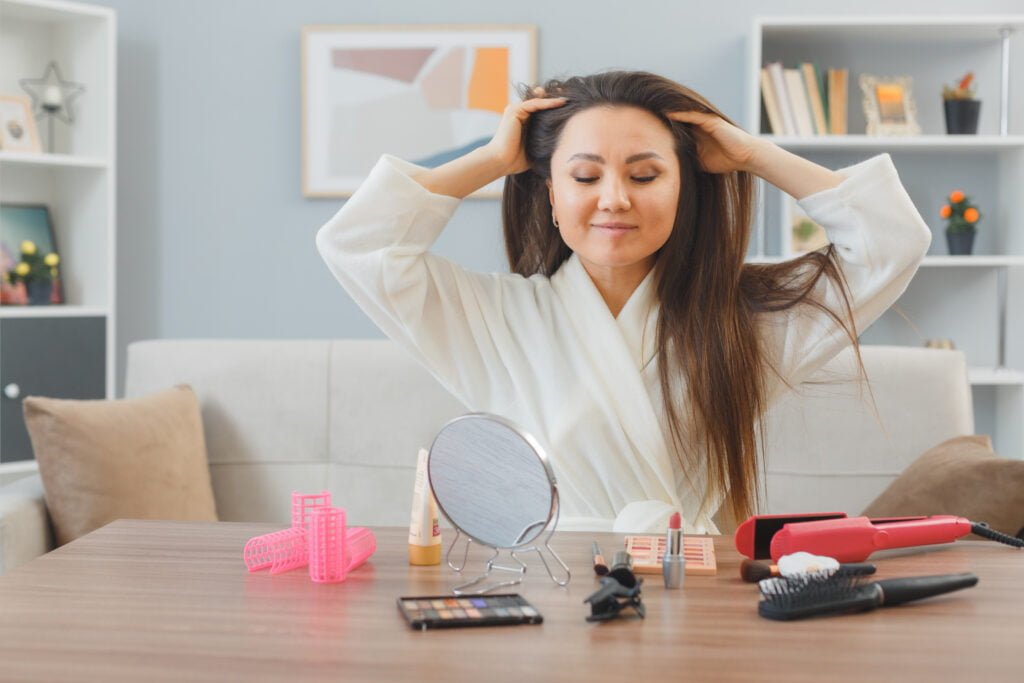Are you troubled by excessive hair fall? Is the sight of hair strands on your comb causing you distress? Don’t worry; you are not alone! Hair fall is a common concern that affects many people. However, the good news is that there are several simple and natural methods to combat hair fall and promote hair growth.
In this comprehensive guide, we will explore various ways to stop hair falling out effectively. From lifestyle changes to home remedies, we’ve got you covered. So, let’s dive in and take control of your hair health!
Understanding Hair Fall
Hair fall is a natural process that occurs as part of the hair growth cycle. It is normal to lose a certain amount of hair daily. However, when the hair fall becomes excessive and noticeable, it may indicate an underlying problem. Understanding the hair growth cycle and the factors affecting it can help in finding effective solutions for hair fall.
Common Causes of Hair Fall: Several factors contribute to hair fall, and identifying the root cause is crucial for finding the right solution. Some common causes include hormonal imbalances, nutritional deficiencies, stress, improper hair care practices, and genetic predisposition. By addressing these causes, we can significantly reduce hair fall.
The Science Behind Hair Loss
Hair loss is a common concern that affects individuals of all ages and genders. Understanding the science behind hair loss is essential to address the issue effectively. This article will delve into the hair growth cycle, its phases, causes of hair loss, and how to distinguish between temporary and permanent hair loss.
The hair growth cycle consists of three main phases: anagen, catagen, and telogen.
Anagen Phase: This is the active growth phase, during which hair follicles produce new hair cells. It typically lasts between 2 to 7 years and determines the length of hair.
Catagen Phase: Also known as the transitional phase, it is relatively short, lasting about 2 to 3 weeks. In this phase, hair growth stops, and the hair follicle begins to shrink.
Telogen Phase: The resting phase, which lasts around 2 to 3 months. During this time, the old hair is released and falls out, making way for new hair growth.
After the telogen phase, the cycle repeats, and new hair starts growing from the same follicles.
Genetic Factors: Hereditary or genetic hair loss, also known as androgenetic alopecia, is the most common cause of hair loss. It occurs due to a genetic predisposition that leads to the sensitivity of hair follicles to dihydrotestosterone (DHT), a hormone derived from testosterone. Over time, DHT causes the hair follicles to shrink, resulting in shorter and thinner hair, eventually leading to hair loss.
Hormonal Factors: Hormonal changes can trigger hair loss. For example, hormonal imbalances during pregnancy, childbirth, menopause, or thyroid disorders can lead to temporary hair shedding. Additionally, an excess of androgens (male hormones) in both men and women can contribute to hair loss.
Environmental Factors: Several environmental factors can cause temporary hair loss. These include physical stressors like major surgery, illness, or accidents, emotional stress, nutritional deficiencies, certain medications, and harsh hair treatments like excessive use of styling products, heat, or chemical processes.
Temporary Hair Loss:
Telogen Effluvium: A common form of temporary hair loss triggered by significant stress, illness, or surgery. Hair shedding usually occurs about 2 to 3 months after the triggering event and is often temporary, resolving on its own.
Alopecia Areata: An autoimmune condition that causes sudden hair loss in round patches on the scalp. In many cases, hair regrowth can occur without treatment.
Permanent Hair Loss:
Androgenetic Alopecia: The most common cause of permanent hair loss, especially in men, characterized by a receding hairline and thinning hair on the crown.
Female Pattern Hair Loss: Similar to androgenetic alopecia, but the hair thins more diffusely over the top of the scalp in women.
The Role of Nutrition in Hair Health
Proper nutrition plays a vital role in maintaining healthy and strong hair. Nutrients like protein, biotin, iron, zinc, and vitamins A, C, and E are essential for hair growth. Incorporating a well-balanced diet enriched with these nutrients can help prevent hair fall and promote luscious locks.
Best Foods for Healthy Hair
Want to know what foods are best for your hair? Here’s a list of hair-friendly foods that you must include in your diet. These superfoods are packed with essential nutrients that nourish your hair from within, reducing hair fall and boosting its natural shine.
- Salmon: Rich in omega-3 fatty acids, salmon promotes scalp health and reduces inflammation, preventing hair fall.
- Eggs: A great source of protein and biotin, eggs strengthen the hair shaft and promote new hair growth.
- Spinach: Loaded with iron, folate, and vitamins A and C, spinach ensures proper oxygenation to the scalp, reducing hair fall.
- Nuts and Seeds: Almonds, walnuts, flaxseeds, and chia seeds provide vital nutrients like zinc and vitamin E for healthy hair.
- Greek Yogurt: Packed with protein and vitamin B5, Greek yogurt helps in strengthening hair follicles.
Hair Care Tips for Hair Fall Prevention

Proper hair care habits are essential for maintaining hair health and preventing hair fall. Follow these tips to ensure your hair remains strong, vibrant, and free from excessive shedding:
- Use a Wide-Toothed Comb: Minimize hair breakage by using a wide-toothed comb to detangle wet hair gently.
- Avoid Heat Styling: Excessive heat styling can damage hair proteins, leading to increased hair fall. Opt for heatless styling methods whenever possible.
- Regular Trims: Trim your hair regularly to get rid of split ends and promote healthy growth.
- Choose Mild Shampoos: Harsh chemicals in shampoos can weaken hair roots. Use mild, sulfate-free shampoos suitable for your hair type.
- Don’t Overwash: Washing hair daily can strip away natural oils, causing dryness and breakage. Aim for 2-3 times a week.
- Protect from UV Rays: Sun exposure can damage hair proteins. Wear a hat or use hair products with UV protection.
Natural Home Remedies for Hair Fall

Mother nature offers us a treasure trove of natural remedies to combat hair fall. These simple and cost-effective home remedies can nourish your hair and promote hair growth without any harmful side effects.
- Aloe Vera Gel: Aloe vera contains enzymes that promote hair growth, reduce scalp inflammation, and prevent hair fall. Apply fresh aloe vera gel to your scalp and hair for best results.
- Onion Juice: Rich in sulfur, onion juice improves blood circulation to the hair follicles, stimulating hair growth and reducing hair fall.
- Coconut Milk: Extract fresh coconut milk and apply it to your hair. It provides essential nutrients that strengthen hair and prevent breakage.
- Fenugreek Seeds: Soak fenugreek seeds in water overnight and grind them into a paste. Apply this paste to your scalp to reduce hair fall and dandruff.
- Green Tea Rinse: Green tea is rich in antioxidants that promote hair growth and reduce hair fall. Use it as a hair rinse after shampooing.
- Amla juice: Amla, rich in vitamin C and antioxidants, nourishes the scalp and strengthens hair follicles, reducing hair fall. Apply fresh Amla juice to the scalp, leave for 30 mins, then rinse with a mild cleanser. Condition afterwards for smooth hair. Use 1-2 times weekly for best results.
- Henna powder: aids hair regrowth like minoxidil for telogen effluvium. Blend henna leaves with water to form a paste. Apply on scalp and hair, leave for an hour, then rinse. Use organic henna powder if fresh leaves are unavailable. Repeat as needed for best results.
Scalp Care and Hair Loss Prevention
Maintaining a healthy scalp is crucial for preventing hair loss and promoting hair growth. Understanding the connection between scalp health and hair loss can help us implement effective care routines. Here, we explore the benefits of scalp massage and natural remedies for optimal scalp care.
A healthy scalp provides a conducive environment for strong and vibrant hair. When the scalp is clean, moisturized, and free from excess oil and debris, it promotes better hair growth. On the other hand, an unhealthy scalp, characterized by dryness, inflammation, or excessive oiliness, can lead to weakened hair follicles and increased hair loss.

Scalp massage is a simple yet powerful technique to improve scalp health and stimulate hair growth. Gently massaging the scalp with fingertips enhances blood circulation, delivering essential nutrients and oxygen to the hair follicles. This increased blood flow can revitalize hair follicles and promote healthier, thicker hair growth.
Several herbal remedies have been traditionally used to address hair loss. Some popular options include:
Saw Palmetto: Derived from the fruit of the Serenoa repens plant, saw palmetto may inhibit the enzyme responsible for converting testosterone into dihydrotestosterone (DHT). By blocking DHT, saw palmetto may help prevent hair follicle shrinkage and hair loss.
Amla (Indian Gooseberry): Rich in vitamin C and antioxidants, amla can nourish the scalp and strengthen hair follicles, reducing hair fall and promoting healthier hair growth.
Ginseng: Ginseng root extract may stimulate hair follicles and promote hair growth. It can also help improve scalp health by reducing inflammation.
Pumpkin Seed Oil: Pumpkin seed oil is believed to inhibit the 5-alpha-reductase enzyme, which converts testosterone to DHT. By doing so, it may help prevent hair loss.
Essential Oils for Hair Fall Treatment
Essential oils are concentrated plant extracts with potent properties. Many essential oils, such as rosemary, lavender, and peppermint, have been shown to promote hair growth, strengthen hair follicles, and reduce hair fall. Learn how to use these oils effectively for healthy and lustrous hair.
Hair Fall Myths
There are many misconceptions surrounding hair fall that can lead to confusion and ineffective remedies. Let’s debunk some common hair fall myths:
A. Myth: Shampooing Causes Hair Fall
Fact: Shampooing doesn’t directly cause hair fall. In fact, regular cleansing removes dirt and excess oils, promoting a healthy scalp.
B. Myth: Wearing Hats Leads to Hair Loss
Fact: Wearing hats doesn’t cause hair fall unless they are excessively tight, which may lead to hair breakage.
C. Myth: Cutting Hair Promotes Growth
Fact: Hair growth happens at the roots, so cutting hair won’t directly affect its growth rate. Trimming helps remove split ends, making the hair appear healthier.
D. Myth: Hair Fall Is Only Genetic
Fact: While genetics can play a role, hair fall can result from various factors like stress, diet, and hair care practices.
E. Myth: Hair Fall Increases with Age
Fact: Hair fall can occur at any age, and its severity depends on individual factors and overall health. Seeking Professional Help
Seeking Professional Help
If you’ve tried various remedies without success, it’s time to seek professional help. A dermatologist or trichologist can diagnose the underlying cause of your hair fall and recommend personalized treatments. Early intervention can prevent further hair loss and restore hair health.
Lifestyle Changes for Healthy Hair

In addition to specific treatments, making lifestyle changes can significantly impact hair health. Consider these tips:
- Stay Hydrated: Drink plenty of water to keep your hair and scalp hydrated.
- Exercise Regularly: Physical activity improves blood circulation to the scalp, promoting hair growth.
- Quit Smoking: Smoking can damage hair follicles, leading to hair fall.
- Reduce Stress: Practice relaxation techniques to manage stress effectively.
- Get Enough Sleep: A good night’s sleep is essential for overall health, including hair health.
FAQS
Can stress cause hair fall?
Yes, chronic stress can disrupt the hair growth cycle and lead to hair fall.
Can hair fall be reversed naturally?
In many cases, hair fall can be reduced and hair health improved naturally through lifestyle changes and proper care.
Are home remedies safe for all hair types?
Most home remedies are safe, but it’s essential to do a patch test before trying them extensively.
Is hair fall during seasonal changes normal?
Yes, mild hair fall during seasonal changes is common and usually temporary.
Does having long hair make your hair fall out?
No, having long hair does not cause it to fall out unless you are always pulling and tugging at your hair.
How often should I wash my hair to prevent hair loss?
To prevent hair loss, wash your hair based on your scalp’s needs, using a gentle shampoo. Avoid overwashing, consider your lifestyle, and use conditioner on the ends. Be gentle with wet hair, massage your scalp, and maintain a healthy diet. If concerned, seek professional advice.
 Hair fall treatment needs consistency and patience. Whether diet, home remedies, or professional treatments, results take time. Stick to your methods, be patient, and improvements will come.
Hair fall treatment needs consistency and patience. Whether diet, home remedies, or professional treatments, results take time. Stick to your methods, be patient, and improvements will come.








